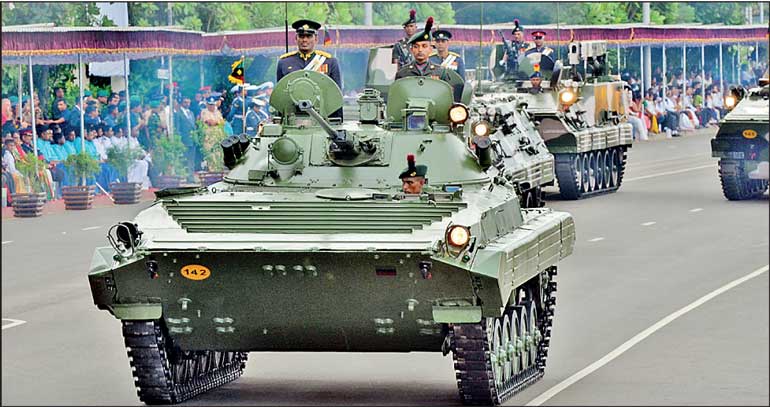Wednesday Feb 18, 2026
Wednesday Feb 18, 2026
Tuesday, 13 February 2024 00:00 - - {{hitsCtrl.values.hits}}

Following independence, Sri Lanka is still continuing as a fledgling state tasked with the tremendous burden of democracy – Pic by Shehan Gunasekara
 Preamble
Preamble
Over three decades since leaving Sri Lanka and having been here for holidays one to two months in 2-3-year intervals, it has been observed a significant decline of leadership and Government administrations. The reason for the decline could be reasonably hypothesised to be a vacuum created after the British left and leaving local politicians in the wilderness. Our independence (4 February 1948) came as a surprise nearly six months after Indians secured their Independence (15 August 1947), where the locals were unprepared to take over the reign hitherto governed by the British. In contrast, Indians were well prepared as they gained independence after a long nonviolent nationalistic movement led by Mahatma Gandhi and his cohorts. History shows national goals were set aside and prioritised the individual needs towards grabbing state power, mastered the “divide and rule”, copied from colonial powers on ethnic, religious and caste lines.
Neighbouring countries
While other countries make leaps and bounds in economic progress, Sri Lanka remains frozen in time. In terms of Foreign Direct Investments (FDI), Sri Lanka performed very poorly compared to Bangladesh, Vietnam, Thailand, South Korea over the past several years, SL politicians made promises in their election platforms but never achieved all false promises. The Port City is still at the infant stage to find proper investments, to be watchful of not encouraging empty “corporate shells” with no real business but sole aim to minimise global taxing. Few days ago, the leader of JVP/NPP criticised the FDIs and explained that our investments are not determined based on SL requirements but on geo-political grounds. This shows we have been pushed and pulled by extraneous factors limiting favourable economic outcomes. It is regrettable that Sri Lanka is not anymore, a non-aligned nation which we had been proud of.
Sri Lankan style of leadership – pre-colonial
Under the leadership of Kings who governed the country prior to the invasion by Portuguese in 16th century AD, the style of governance was monarchist, where the political system was based upon the undivided sovereignty or rule of a single person, a King. Nevertheless, there were internal conflicts, conspiracies, however the country progressed and was self-sufficient in food and agriculture, not dependent on any other nations.
During this era, Sri Lanka was known as the Granary of East Asia for millet and paddy cultivation. The ancient kings built several tanks for irrigation and the excess harvest was imported to counties of East Asia. These tanks are still being used. One notable development was the Minneriya tank built by King Mahasen during his regime AD 276-303. This tank occupied 4,670 acres and its strong 13-metre-tall dam running along a distance of 2 km held over 20 billion gallons of water – fulfilling the agricultural needs of his people.
Sigiriya and its site development during King Kashyapa’s regime (AD 477-495), Aukana Buddha statue made at the behest of King Dhatusena (5th century) were testimony of the visions of the kings, the engineering knowledge and skills in planning, development of large-scale projects.
It is also to be noted that sound indigenous technology prevailed in the pre-colonial era. Wewai, Pansalai and Dagabi (Reservoir, Temple and Dagoba) were the key to the development of irrigation systems, preserving water from different seasons rainy and dry for cultivation irrespective of seasonal changes. The status quo prevailed pre-colonial era and has been uprooted and ruined beyond restoration by invaders to become dependent on the colonial epicentre for the long term.
Foreign invasions
From the 16th century, the island, now known as Sri Lanka experienced varying degrees of rule from several prominent European powers of the time: the Portuguese (1597-1658), the Dutch (1658-1796) and the British (1815-1948) all had control over some or all of the island. This led to mass killings of natives, completely demolishing the traditional Sri Lankan administration hitherto followed and planting the new style of governance. Over the period 1597 to 1948, three and a half centuries since independence from the last occupants, the British, created a vacuum in the administration and governance.
Hypothesis – Sri Lanka imported democracy too soon
This might be a shocking statement but there are lessons to be learnt and assessed. Upon reviewing some of the most advanced economies in the world, for example Scandinavian countries, Japan, the United Kingdom and other Anglophonic nations, Germany and other continental European countries they all have one thing in common; a largely democratic system of government. But what is often overlooked is the journey of these nations towards democracy. These nations had a system of highly authoritarian before power was devolved to its citizens. Listed are few countries’ transition to democracy and successfully continuing
[1] UK and Japan: from Monarchy;
[2] Germany: Rapid industrialisation fuelled by warring neighbouring nations;
[3] US: Entrepreneurial;
[4] Canada, Australia and NZ: Migration and natural resources have propped up these nations;
Transition to communism or pseudo-democracy
[5] Russia a namesake democracy, their monarchy was dismantled before its working class was elevated to the proletariat; and
[6] China, North Korea, and to a certain extent, France, dismantled their monarchies and embraced communism as the preferred governing model.
Westminster model of Democracy – post-independence
After three and a half centuries of foreign rule, the island nation then called Ceylon received independence from Britain and inherited a Westminster style parliamentary democratic system. Over this period the traditional monarchist systems prevailed while Sinhalese kingdoms were crushed deliberately and the democratic system of governance was implanted. Was the transition too soon? Were the locals capable of carrying on with the new system of governance? These questions need a fair assessment in the wake of the current economic situation. The mindsets of leaders who came to power, post-independence, had neither vision nor national plan aligned with the changing world environment.
The constitution has been changed twice, in 1972 scrapping the senate and bringing a republican constitution. In 1977 made a complete overhaul of the political landscape, bringing in the executive presidency and preferential voting system to elect members of parliament on district basis on party lines. The current constitution has been amended 21 times, primarily based on the needs of the executive to centralise the power and the wishes of the majority party governing Sri Lanka. The two significant changes to the constitution diminished the check-and-balance in respect of activities of executive and legislator, thus forming dictatorship leading to corruption, favouritism and intimidation. The abrupt and too soon opening of the economy after 1977 to accelerate was the start of mass-scale corruption to grow at every level of the society without fear also destroying local small-scale industries.
Successive governments
The maxims of governments since 1977, Dharmishta-samajayak, Asiyawe Ashchariya, Mahinda-Chinthanaya, Yahapalanaya and lately Viyath-Maga, etc. However, the elective governments on the said basis performed the opposite of what was promised, systematically destroyed the country to bankruptcy and to the knees of international communities for aid, regrettably losing the dignity and self-esteem of Sri Lankan identity.
The war against LTTE separatists, JVP insurrection, unhealthy financial policies, poor investment decisions, unfilled and untold promises of successive Governments led in destroying the economy; no concerns of primary account balance (achieved only once), excessive borrowing at commercial rates, to pay debts, built economically non-viable assets with no concerns on Return on Investments led to increase poverty level across the nation.
Conclusion
Following independence, Sri Lanka is still continuing as a fledgling state tasked with the tremendous burden of democracy. Over the past 76 years, post-independence, Sri Lanka has failed to learn from other industrialised nations to apply democratic principles despite being called Socialist Democratic Republic and has provisions in the constitution. The powerful internal factions gradually drove the nation to Sinhalese Buddhist extremism thus creating disharmony among ethnic and religious lines.
Upon making Sinhala as official language in 1956 and allowing reasonable use of Tamil language, the SWRD Bandaranaike-SJV Chelvanayakam Pact was signed in 1957 between then Prime Minister SWRD and SJV thus creating a series of regional councils in Sri Lanka as a means to giving a certain level of autonomy to the Tamil people of the country, and was intended to solve the communal disagreements that were occurring in the country at the time. However, the powerful Sinhalese factions opposed strongly and were abandoned. The disharmony later created a 30-year civil war and every one suffered its consequences. The narrow minded, ethnically and religiously motivated groups destroyed the nation in all respects, economically, socially and politically.
As previously mentioned, after the British left, our local leaders were in wilderness and failed, to date formulating a national policy framework, fulfilling the aspiration of its citizens with due consideration and agility to the changing world environment, i.e. geopolitics, proliferation of technology and automation to increase productivity.
Our leaders without vision, self-centred, have brought the country to bankruptcy and now the revival process is being carried out with State thuggery and not listening to the needs of the public, especially the most vulnerable.
In contrast, the State machinery was highly inefficient, even for a small job, one has to visit multiple times as the officials request fresh evidence and documentation every time you visit. Long queues, queues are not served in an orderly manner, friends jump over the queue with the connection they have with the officials. Even in a bankrupt country an orderly servicing queue is easily established.
During my recent visit, I have seen in every corner of streets people begging for food, disowned dogs wait longingly for their human companions, casual labourers looking for gardening jobs of labour intensity to meet their daily expenses. One notable scene that shocked me was when an amputee lies behind a dirty bus stand as flies flock to her bandaged stub seeping blood. These are not uncommon elsewhere in the country.
Are we heading for Lumpen Capitalism? Appears to be so, where vagrants, beggars, and criminal elements are becoming widespread.